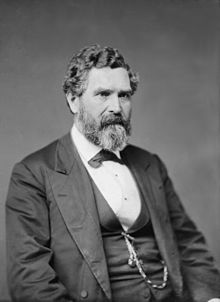James B. Beck
James Beck | |
|---|---|
 | |
| Chairman of the Senate Democratic Caucus | |
| In office March 4, 1885 – May 3, 1890 | |
| Preceded by | George H. Pendleton |
| Succeeded by | Arthur Pue Gorman |
| United States Senator from Kentucky | |
| In office March 4, 1877 – May 3, 1890 | |
| Preceded by | John W. Stevenson |
| Succeeded by | John G. Carlisle |
| Member of the U.S. House of Representatives from Kentucky's 7th district | |
| In office March 4, 1867 – March 3, 1875 | |
| Preceded by | George S. Shanklin |
| Succeeded by | Joseph Blackburn |
| Personal details | |
| Born | James Burnie Beck February 13, 1822 Dumfriesshire, Scotland, UK |
| Died | May 3, 1890 (aged 68) Washington, D.C., U.S. |
| Political party | Democratic |
| Education | Transylvania University (BA) |
| Signature | |
James Burnie Beck (February 13, 1822 – May 3, 1890) was a United States Representative and Senator from Kentucky.
Life[]
Born in Dumfriesshire, Scotland, Beck immigrated to the United States in 1838 and settled in Wyoming County, New York. He moved to Lexington, Kentucky in 1843 and graduated from Transylvania University in 1846. Beck was admitted to the bar and commenced the practice of law in Lexington. Until shortly before the Civil War, he was law partner of John C. Breckinridge, the U.S. Vice President who became a Confederate general; during the Civil War, Beck was interrogated by a military commission about his knowledge of his former partner's activities.
After the war Beck was elected as a Democrat to the United States House of Representatives serving Kentucky's district 7. He was appointed to the Committee on Reconstruction where it was expected that as a newcomer and an immigrant he would be no obstacle to Republican intentions, but he immediately became a tenacious advocate of the rights of the defeated states. A White supremacist, he opposed Civil Rights for African Americans.[1] He was elected to the Fortieth and to the three succeeding Congresses, serving in all from March 4, 1867 to March 3, 1875.
In 1876, Beck was appointed a member of the commission to define the boundary line between Maryland and Virginia. He was then elected to the United States Senate in 1876, being reelected twice and serving in all from March 4, 1877, until his death in Washington, D.C., on May 3, 1890. While in the Senate, Beck was the Democratic Conference Chairman from 1885 to 1890, and the chairman of the Committee on Transportation Routes to the Seaboard. He was prominent in the discussion of tariff and currency questions.
He is interred at Lexington Cemetery. His son, George T. Beck, was a noted politician and entrepreneur in the state of Wyoming.
See also[]
- List of United States senators born outside the United States
- List of United States Congress members who died in office (1790–1899)
Notes[]
This article includes a list of general references, but it remains largely unverified because it lacks sufficient corresponding inline citations. (July 2014) |
- ^ Friedlander, Alan; Gerber, Richard Allan (November 22, 2018). Welcoming Ruin: The Civil Rights Act of 1875. ISBN 9789004384071.
References[]
- United States Congress. "James B. Beck (id: B000289)". Biographical Directory of the United States Congress.
- U.S. Congress. Memorial Addresses for James Beck. 51st Cong., 2nd sess. from 1890 to 1891. Washington, D.C.: Government Printing Office, 1891.
- Gilman, D. C.; Peck, H. T.; Colby, F. M., eds. (1905). . New International Encyclopedia (1st ed.). New York: Dodd, Mead.
- Wilson, J. G.; Fiske, J., eds. (1900). . Appletons' Cyclopædia of American Biography. New York: D. Appleton.
- 1822 births
- 1890 deaths
- 19th-century American politicians
- British emigrants to the United States
- Democratic Party members of the United States House of Representatives
- Democratic Party United States senators
- Kentucky Democrats
- Kentucky lawyers
- Members of the United States House of Representatives from Kentucky
- People from Dumfries and Galloway
- People from Wyoming County, New York
- Transylvania University alumni
- United States senators from Kentucky
- 19th-century American lawyers
